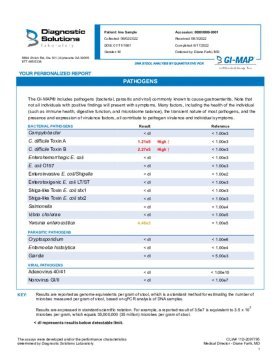Is Irritable Bowel Syndrome (IBS) an Auto Immune Disease?
What an autoimmune disease is
Autoantibodies
What are common GI autoimmune disorders?
Ulcerative colitis and Crohn's disease are the most common autoimmune disorders grouped as inflammatory bowel disease (IBD) where the immune system attacks the bowel and causes inflammation and damage. Both of these are chronic disease and interrupt bowel function.
Crohn's disease: is in small or large intestine and can cause abdominal pain, diarrhea, weight loss, anemia, and fatigue. Some people may be symptom free most of their lives, while others can have severe chronic symptoms that never go away. More research is changing how it is classified, showing that it is more autoinflammatory in nature. No antibody has been identified to be associated with Crohn's disease. No blood test can find the "Crohn's" antibody and diagnose the disease, as is the case for other autoimmune conditions.
Irritable Bowel Syndrome Symptoms
Irritable bowel syndrome has similar symptoms. IBS symptoms have a huge range and are different in each person. Some people experience constipation predominant IBS (IBS C), others experience diarrhea predominant IBS (IBS D), even mixed IBS (IBS M: alternating constipation and diarrhea). Other symptoms include chronic pain, gas, bloating, reflux and/or functional dyspepsia.
Generally the tissue in IBS appears normal. Treatment options have included proton pump inhibitors (acid blockers), antispasmodics, more fiber or probiotics. Unfortunately these things can increase GI symptoms discussed in more detail below. Thankfully, ongoing research is shedding light on potential causes of chronic irritation in the gastrointestinal tract.
Irritable Bowel Syndrome and the immune system
In some cases with stool testing, you can see that there is immune activation through two biomarkers: SIgA and Calprotectin.
SIgA: Immunoglobulin A is the primary immunoglobulin in the intestinal mucosa. It represents a “first line of defense” in response to antigens and pathogens in the GI and respiratory tracts. In addition to protecting against pathogens, SIgA plays a major role in helping to maintain balance in the microbiome and protecting against exposure to food-derived antigens. This can be either high, normal or low. When is it is low: the gut immune system is suppressed. When it is high: there is an elevated immune response to antigens in the GI tract. Therapeutic approaches can be taken for either high or low levels.
Calprotectin: Fecal calprotectin is the most studied marker of gastrointestinal inflammation. High calprotectin indicates neutrophil infiltration to the gut mucosa. Calprotectin is the gold standard marker for the diagnosis and monitoring of inflammatory bowel disease. It is used to differentiate IBD from irritable bowel syndrome. In the case of inflammatory bowel disease, calprotectin will remain high, but with irritable bowel syndrome IBS, this marker can go down to normal levels if addressing the root cause of the IBS.
Is IBS an auto immune disease?
In short: yes, in some people. Dr. Pimentel is a leading researcher in IBS and similar symptoms. His research team has a new understanding that IBS D is most likely caused from food poisoning from bacterial infections like Campylobacter jejuni, Salmonella, E. coli and Shigella. These bacteria release the CdtB toxin, which causes the immune system to create autoantibodies to attack vinculin and permanently harm the gut tissue. This process is unique from other inflammatory bowel disease like inflammatory ulcerative colitis, Crohn's disease and other gut autoimmune diseases.
IBS and bacterial overgrowth
So many things can be interrupted along the digestive tract. There can be a population of bacteria from the large intestine that transfer to the small intestine called SIBO (small bacterial overgrowth) causing IBS D. There can be an overgrowth of a type microbes called Methanobrevibacter smithii, which release methane and cause IBS C. This is now being coined Intestinal Methanogenic Overgrowth (IMO).
Fiber can feed these overgrowths causing bloating, abdominal pain, constipation and diarrhea. Some bacterial strains can also release histamine and make patients more sensitive to high histamine foods. The underlying cause of bacterial shifts in the GI tract can be from antibiotics, acid blockers, poor diet, chronic psychological distress, problems with nerve function, poor digestive organ function in the stomach, gallbladder and pancreas or abdominal trauma from a surgery or accident.
IBS and other causes
Just as bacteria can cause issues, so can other microbes like parasites, yeasts, molds and viruses. These all can cause the same GI symptoms as mentioned above.
GI Map by Diagnostic Solutions
How do we determine the cause of your irritable bowel syndrome? We use a the GI Map stool test by Diagnostic Solutions and it gives us tons of insight. This test determines what types of microbes are causing problems, how much your immune system is being activated, how well you are detoxing and how well your digestive system is working. We can use all of that information to give you a personalized protocol for resolving your IBS. The majority of our clients see 90+% improvement in 90 days.




